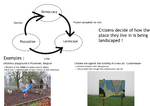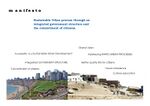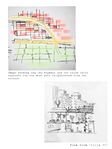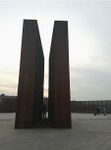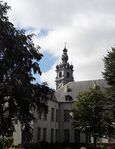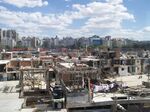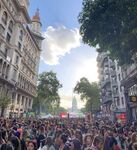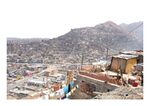LED Online Seminar 2019 - Working Group 1
--> Back to working group overview
Dear working group members. This is your group page and you will be completing the template gradually as we move through the seminar. Good luck and enjoy your collaboration!
Assignment 1 - Reading and Synthesizing Core Terminology
- You can read more details about this assignment here
- Readings are accessible via the resources page
Step 1: Your Landscape Democracy Manifestoes
Step 2: Define your readings
- Please add your readings selection for the terminology exercise before April 24:
A: Landscape and Democracy
- Thi Mai Hanocq - The European Landscape Convention
B: Concepts of Participation
- Nayan Jee- Hester, Randolph (2005): Whose Politics
- Thi Mai Hanocq - Consensus Design
- Tatiana Rodriguez Giesso- Hester, Randolph: A refrain with a view
- Raquel Mego - Sanof, Henry (2014): Multiple Views of Participatory Design, Focus
C: Community and Identity
- Nayan Jee- Welk Von Mossner, Alexa (2014): Cinematic Landscapes
- Raquel Mego - Spirn, Anne: Resting Mill Creek
D: Designing
- Thi Mai Hanocq - Life, Liberty and the Pursuit of Sustainable Happiness
- Raquel Mego - Hester, Randolph: Democratic Drawing - Techniques for Participatory Design
- Smith, Nicola Dawn(2012): Design Charrette: A Vehicle for Consultation or Collaboration
E: Communicating a Vision
- Nayan Jee- 'Reading the Landscape' by Simon Bell, EMU Tartu
- Tatiana Rodriguez Giesso - Case study - Water Square Benthemplein
Steps 3 and 4: Concepts Selection and definition
- Each group member selects three relevant concepts derived from his/her readings and synthesize them/publish them on the wiki by May 15, 2019
- Group members reflect within their groups and define their chosen concepts into a shared definition to be posted on the wiki by June 12, 2019.
- Other group members will be able to comment on the definitions until June 30, 2019
- Each group will also report on their process to come to a set of shared definitions of key landscape democracy concepts on the wiki documentation until July 12, 2019
Concepts and definitions
Author 1: Thi Mai Hanocq
- Europe Landscape Convention
- Consensus design
- Resilient cities
Author 2: Raquel Mego Arellan
- Participatory design (decision-making process)
- Environmental Justice for Inner-cities neighbourhoods
- Non-verbal techniques forward a democratic landscape design: In order to transform the non-spatial research, community designers use different methods to represent and design appropriately for people. For what designers and citizens needed mutual empathy and a common language to visualize the most profound synthesis of the situation and solve the real problem. Building Community Experientially and Mapping Sacred Landscapes are one of the most attractive techniques, emphasizing the experience of the place, by workshops and walking tours, and recognizing valuable places in the city.
Author 3: ...
- ......
- .......
- .......
Author 4: ...
- ......
- .......
- .......
Step 5: Reflection
Step 6: Revised manifestoes
- please look again at your initial manifestoes and update them with any new aspects/prespectives you have taken up during this seminar
Assignment 2 - Your Landscape Symbols
- You can read more details about this assignment here
Landscape Symbols Author 1: ...
(50° 15′ nord, 4° 36′ est) This picture has been taken in Florennes. It represents a memorial that was made in memory of the soldiers who died during the war 14-18. For me, it is a symbol because everybody in the city knows it, his height and surface attract the eyes of people and impact the landscape, and overall, all the names of the soldiers of my city who died during the war are written on it. Every year, a tribute is done in their honor. Also, I think that this kind of memorial is a track from the paste that allows (and that allowed me) to learn to the younger generations what happened during war.
(44° 30′ 00″ nord, 11° 21′ 00″ est) The Bologna Shoah Memorial is located in Bologna, near the train station. The memorial was made by the joint commitment of the Jewish community, institution and private citizens to remind of the shoah period, the empty orbits reminding of the cells in which people were living in concentration camp. The Municipality suggested to build it at the railway station where happened the bombing of 2 august 1980 which increases even more his nature of memory. For me, it is a landscape symbol because these “towers” are imposing and they impact the landscape, which allows to attract attention of people. This kind of memorial allows us to remember what happened in the past and this part of history is known by most of people. The memorial is understandable by everybody and it is also a track from the past which can learn to the younger generations what happened during war.
(50° 27′ nord, 3° 57′ est) This picture was taken in Mons, in Belgium and on the top, we can see the belfry. For me, belfries are landscape symbols because of their really imposing height and their history. Indeed, during the 17th century, people start building belfries, like the one in Mons to concurrence the church. They wanted to build buildings higher than churches, to show that they had more power. Today, it is a bit less meaningful, as there is not conflicts with the church anymore as there were when the belfry was built, but it is still part of the landscape and we can see it from a lot of places of the city and everybody in the region knows it. To conclude, I think it is a track of the past, but these days, I think that that belfry is more a landmark, thanks to its very high height than a “rebellion” movement, as the conflict between church and other citizens is not topical anymore
Landscape Symbols Author 2: ...
In the back of image we can see the parliament of Buenos aires, with a green roof. It is a very representative monument in my city. As it is the place where laws are discussed and signed, it also came to be a place of reunion for people manifesting and fighting for their own beliefs. This picture in particular, was taken last year. I chose it, because it shows one of the most popular disputes there has been in Argentina in the last years. It was for approving the law of abortion. As the picture shows, lots of people fighting in favor for abortion dressed in green.
This monument is located near the city center of Buenos Aires. It is the entrance to the Park Pereyra Iraola. It is a very well known park in Argentina. It belonged to a very wealthy family, and then, it was taken away by Peron, a really significative president we had, who, in between a lot of things, took away properties from the richest people, and made them public, not even maintaining them, and ruining them. This park, amongst other properties is not even used now, because of its deterioration; But it is a landmark that represents what Peron did.
Landscape Symbols Auther 3: ...
The Landscape symbols of the main city of Peru, Lima, changed over the years. In 1835 Lima center was designed by squares around a big park characterized by buildings with wood balconies in front of the streets. More of them constructed in Colony and Republican times. Lima center has been declared a World Heritage by Unesco in 1988, it concentrate 608 monuments and is one of the most important turistic places in Peru.
But after the migration of people from the Mountain Range to the Coast, around 1965 informal housing exceded formal property. The government could not control de urban growth, and they decided to create Laws that formalize the informal property. For that reason, another landscape symbol of Lima city is the informal hills occupation without accessibility. The picture show the district called El Agustino, located on the East side of Lima city.
Assignment 3 - Role Play on Landscape Democracy "movers and shakers"
- You can read more details about this assignment here
Assignment 4 - Your Landscape Democracy Challenge
- You can read more details about this assignment here
- Each group member will specify a landscape democracy challenge in his/her environment
Landscape Democracy Challenge 1
- Give a title to your challenge
- Yourname challenge 1.jpg
caption: why did you select this case?
- Yourname challenge 2.jpg
caption: what is the issue/conflict (1)
- Yourname challenge 3.jpg
caption: what is the issue/conflict (2)
- Yourname challenge 4.jpg
caption: who are the actors?
Your references:
- ...
- ...
Landscape Democracy Challenge 2
- Give a title to your challenge
- Yourname challenge 1.jpg
caption: why did you select this case?
- Yourname challenge 2.jpg
caption: what is the issue/conflict (1)
- Yourname challenge 3.jpg
caption: what is the issue/conflict (2)
- Yourname challenge 4.jpg
caption: who are the actors?
Your references:
- ...
- ...
Landscape Democracy Challenge 3
- Give a title to your challenge
- Yourname challenge 1.jpg
caption: why did you select this case?
- Yourname challenge 2.jpg
caption: what is the issue/conflict (1)
- Yourname challenge 3.jpg
caption: what is the issue/conflict (2)
- Yourname challenge 4.jpg
caption: who are the actors?
Your references:
- ...
- ...
Landscape Democracy Challenge 4
- Give a title to your challenge
- Yourname challenge 1.jpg
caption: why did you select this case?
- Yourname challenge 2.jpg
caption: what is the issue/conflict (1)
- Yourname challenge 3.jpg
caption: what is the issue/conflict (2)
- Yourname challenge 4.jpg
caption: who are the actors?
Your references:
- ...
- ...
Your Democratic Change Process
- Add Title
- Your Democratic Change Process Slide1.jpg
caption: ...
- Your Democratic Change Process Slide2.jpg
caption: ...
- Your Democratic Change Process Slide3.jpg
caption: ...
- Your Democratic Change Process Slide4.jpg
caption: ...
Reflection
- ....
- ....
- ....
Conclusion:
- ....
- ....
- ....
Your references
- ...
- ...
- ...
